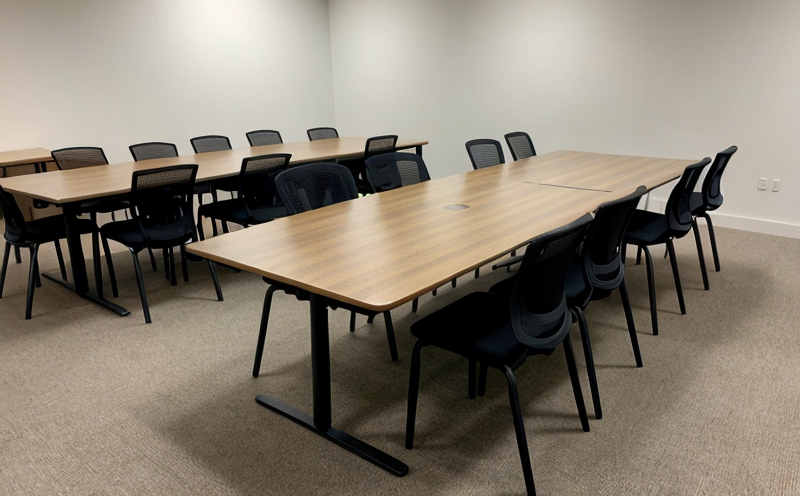ASTM D2196 Rheological Properties of Table Surface Coatings Testing
The ASTM D2196 standard provides a method to measure the rheological properties of table surface coatings. This is particularly important for ensuring that the coating not only adheres well but also maintains its integrity under various conditions, such as wear and tear from everyday use.
Rheological properties are crucial in determining how a coating behaves when subjected to forces or shear stresses. The testing procedure outlined in ASTM D2196 involves applying a force to the coated surface and measuring the resulting deformation over time. This helps manufacturers understand the dynamic behavior of their coatings, which is essential for predicting long-term performance.
When performing this test, it is important to ensure that the specimen preparation meets the required standards as specified in ASTM D2196. The specimen should be a representative sample of the table surface coating, free from defects and flaws that could affect the results. Proper cleaning and conditioning of the specimen are also critical steps.
The testing apparatus used for this procedure typically includes a rheometer capable of applying controlled shear stress to the coated surface. The rheometer records the deformation as a function of time, providing valuable data on the viscoelastic properties of the coating. This data can then be analyzed to determine key parameters such as viscosity and elasticity.
Understanding these properties is vital for optimizing the formulation of table surface coatings. By tailoring the rheological characteristics to meet specific performance requirements, manufacturers can enhance the durability and aesthetic appeal of their products. For instance, a coating with optimal viscoelastic properties can resist cracking under thermal cycling or abrasive conditions, ensuring a longer-lasting finish.
In addition to its role in quality control, ASTM D2196 testing is also valuable for research and development (R&D) purposes. Engineers can use the results of these tests to refine their formulations and improve upon existing products. This iterative process helps drive innovation within the furniture industry, leading to more robust and appealing table surfaces.
The importance of rheological properties extends beyond just the manufacturing stage; it also plays a significant role in compliance with international standards. Many industries rely on such testing to ensure that their products meet regulatory requirements. For furniture manufacturers, adhering to ASTM D2196 can be a key factor in maintaining market access and ensuring customer satisfaction.
Moreover, this testing method helps in identifying potential issues early in the development process, thereby reducing costs associated with rework or product recalls. By catching defects at an earlier stage, companies can improve efficiency and reduce waste. This not only benefits individual manufacturers but also contributes to overall industry standards by setting a benchmark for quality.
Finally, understanding rheological properties through ASTM D2196 testing provides furniture makers with valuable insights into the behavior of their coatings under various conditions. This knowledge enables them to make informed decisions about material selection and process optimization, ultimately leading to superior products that meet both performance expectations and market demands.
Benefits
Enhanced Durability: ASTM D2196 testing ensures that table surface coatings can withstand various environmental conditions, enhancing the overall durability of the furniture products.
Aesthetic Appeal: Understanding rheological properties allows for better control over the appearance and feel of the coated surfaces, leading to more visually appealing finished products.
Cost Efficiency: Early detection of issues through testing helps in minimizing rework and product recalls, thereby reducing overall production costs.
Innovation: By providing detailed insights into coating behavior, ASTM D2196 testing supports continuous improvement efforts, driving innovation within the furniture industry.
Market Access: Compliance with international standards like ASTM D2196 can open up new markets and enhance a company's reputation in the global market.
Customer Satisfaction: Products that meet rigorous testing standards are more likely to satisfy customer expectations, leading to higher satisfaction levels.
International Acceptance and Recognition
The ASTM D2196 standard is widely recognized across the globe for its stringent requirements in evaluating rheological properties of table surface coatings. Its acceptance by various regulatory bodies ensures that furniture manufacturers can rely on consistent quality standards regardless of their geographical location.
This international recognition not only simplifies compliance but also fosters trust among consumers who know they are purchasing products that adhere to high-quality benchmarks. Manufacturers who adopt ASTM D2196 benefit from broader market reach and increased customer confidence, which can translate into greater sales and brand loyalty.
Furthermore, adherence to such standards helps companies stay ahead of industry trends by ensuring their products remain competitive in a rapidly evolving marketplace. By implementing ASTM D2196 testing practices, furniture manufacturers demonstrate their commitment to excellence, thereby positioning themselves as leaders in the sector.
Competitive Advantage and Market Impact
The ability to accurately measure rheological properties using ASTM D2196 gives furniture manufacturers a significant competitive edge. It enables them to produce high-quality products that stand out in the market, attracting discerning customers who value reliability and durability.
In today’s competitive landscape, where sustainability and innovation are key factors, being able to prove compliance with internationally recognized standards like ASTM D2196 can be a game-changer. It not only sets a benchmark for quality but also helps in differentiating products from competitors, potentially leading to increased market share.
Moreover, the insights gained from ASTM D2196 testing can drive product improvements and lead times, allowing companies to respond more quickly to changing consumer preferences. This agility is crucial in maintaining relevance and staying ahead of trends in the furniture industry.
Frequently Asked Questions
- It helps in optimizing the formulation of table surface coatings to meet specific performance requirements.
- Early identification of defects reduces costs associated with rework or product recalls.
- Provides valuable insights into the behavior of coatings under various conditions, enabling informed decision-making about material selection and process optimization.





